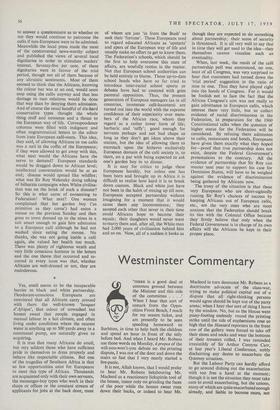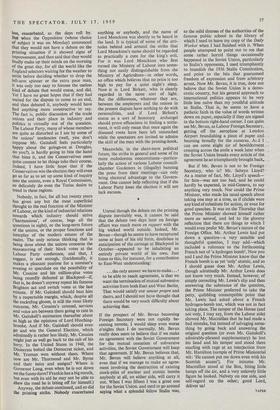Westminster Commentary
It is not, Allah knows, that I would prefer to hear Mr. Robens belabouring Mr. Macleod as a reactionary lickspittle tool of the bosses, intent only on grinding the faces of the poor while the honest sweat runs down their backs, or indeed to hear Mr.
Macleod in turn denounce Mr. Robens as a doctrinaire advocate of the class-war, trying to make political capital out of a dispute that all right-thinking persons would agree should be kept out of the party arena; when I hear that sort of thing I leave by the window. No, but as the House went pussy-footing uselessly round the printing strike until the tide of euphemisms rose so high that the Hansard reporters in the front row of the gallery were forced to take off their shoes and socks and wear the bottoms of their trousers rolled, I was reminded irresistibly of Sir Arthur Comyns Carr, at last year's Liberal Conference, nobly disclaiming any desire to exacerbate the Quemoy situation.
But the Labour Party can hardly afford to go around dishing out the exacerbation with too free a hand at the moment; though it is not the situation they must take care to avoid exacerbating, but the unions, many of which are quite exacerbated enough already, and liable to become more, not less, exacerbated, as the days roll by. But when the Opposition (whose choice of subject it was on Monday) announced that they would not have a debate on the printing situation if it showed signs of improvement, and then said that they would finally make up their minds on the morning of the great day, for all the world like the England selectors waiting for the weather to settle before deciding whether to drop the left-arm spinner or the extra pace man, it was only too easy to foresee the useless kind of debate that would ensue, and did. Yet I have no great hopes that if they had waited for the dispute to come to an end, and then debated it, anybody would have had anything more constructive to say. The fact is, public discussion of the trade unions and their place in industry and Politics is virtually out of the question. The Labour Party, many of whose members are quite as disturbed as I am by some of the unions' tendencies (well, you don't suppose Mr. Gaitskell feels particularly happy about the goings-on at Douglas, do you?), is hardly going to bite the hand that bites it, and the Conservatives seem quite content to let things take their course. Indeed, I have little hope that if the Conservatives win the election they will even go so far as to set up some kind of inquiry Into the unions, even a Royal Commission, so delicately do even the Tories desire to tread in these regions.
Nobody, in fact, for all but twenty years has given any but the most superficial thought to the real function of the Minister of Labour, or the kind of industrial relations towards which industry should strive ('harmonious', of course, begs all the questions in sight), or the long-term future of the unions, or the proper functions and Interplay of the modern estates of the realm. The only serious thinking that is being done about the unions concerns the manoeuvring of their block votes at the Labour Party conference, and that, I suggest, is not enough. (Incidentally, it makes a pleasant pastime for a summer's evening to speculate on the possibility of Mr. Cousins and his million-plus votes being roundly defeated at Blackpool—if, that is, he doesn't anyway repeat his famous Brighton act and switch votes at the last minute. If Mr. Gaitskell should beat him by a respectable margin, which, despite all the encircling gloom, is still the most likely outcome, Mr. Cousins's counsel, services and voice are between them going to rate in Mr. Gaitskell's estimation thereafter about as high as the opinions of Lord Hinching- brooke. And if Mr. Gaitskell should even go and win the General Election, which admittedly is rather less likely, Mr. Cousins might just as well go back to the cab of his lorry. In the United States in 1948, the Dixiecrats bolted the Democrat ticket, and Mr. Truman won without them. Where now are Mr. Thurmond and Mr. Byrne and their heirs and assigns? Where is Governor Long, even when he is not down on the funny-farm? Frankie has a big mouth, but even with its aid he may not be able to chew the meal he is biting off for himself.) Anyway, the debate continued, and so did the printing strike. Nobody exacerbated anything or anybody, and the name of Lord Monckton was shortly to be heard in the land. It is typical of some of the atti- tudes behind and around the strike that Lord Monckton's name should be regarded as practically a cure for the king's evil. For it was Lord Monckton who first turned the Ministry of Labour into some- thing not easily distinguishable from the Ministry of Agriculture—in other words, an office which believes that no price is too high to pay for a quiet night's sleep. Now it is Lord Birkett, who is clearly regarded in the same sort of light. But the differences, whatever they are, between the employers and the unions in the present dispute have nothing to do with personalities, and if Lord Birkett's status as a sort of honorary archangel should prove efficacious in finding a settle- ment, it will only mean that once again the diseased roots have been left untouched while the spectators are invited to admire the skill of the man with the pruning-hook.
Meanwhile, in the short-term political future, the strike in general and some of its more malodorous concomitants—particu- larly the action of various Labour council- chamber Gauleiters in (illegally) banning the press from their meetings—can only bring electoral advantage to the Govern- ment. One cannot help reflecting that if the Labour Party loses the election it will not lack excuses.
•
Unreal though the debate on the printing dispute inevitably was, it cannot be said that the debate two days later on foreign affairs was much more en rapport with the big wicked world outside. Indeed, Mr. Bevan—though he seems to have recaptured some at least of his old form, doubtless in anticipation of the carnage at Blackpool in October—appeared to be inhabiting an entirely private world of his own. Just listen to this, for instance, for a contribution to East-West understanding: ... the only answer we have to make... > to be able to reach agreement, is that we want the termination of mutual subversive activities from both East and West Berlin, That would satisfy our amour propre and theirs, and I should not have thought that there would be very much difficulty about achieving that.
If the prospect of Mr. Bevan becoming Foreign Secretary were not rapidly be- coming remote, I would sleep even worse o'nights than I do normally. Mr. Bevan really does seem to believe that if we make an agreement with the Soviet Government for the mutual cessation of subversive activities, the Soviet Government will keep that agreement. If Mr. Bevan believes that, Mr. Bevan will believe anything at all, even that if we manage to make an agree- ment involving the destruction of existing stock-piles of nuclear and atomic bombs anybody at all, on either side, will carry it out. When I was fifteen I was a great one for the Soviet Union. and used to go around saying what a splendid fellow Stalin was,
to the mild distress of the authorities of the famous public school in the library of which I used to leave my copy of the Daily Worker when I had finished with it. When people attempted to point out to me that some rather horrid things occasionally happened in the Soviet Union, particularly to Stalin's opponents, I used triumphantly to brandish the 1936 Stalin Constitution, and point to the bits that guaranteed freedom of expression and from arbitrary arrest. Now Mr. Bevan, it is true, does not believe that the Soviet Union is a demo- cratic country, but his general approach to international politics appears to be very little less naive than my youthful attitude to Stalin. That is, he seems to have a pathetic faith in the value of words written down on paper, especially if they are signed in the bottom right-hand corner. I can quite see Mr. Bevan, as Labour Foreign Secretary, getting off the aeroplane at London Airport brandishing a piece of paper and beaming broadly for the cameras. Ai .d I can see some slight air of bewilderment creeping across the smile a week later when the Soviet Union breaks every article of the agreement he so triumphantly brought back.
But if Mr. Bevan is not to be Foreign Secretary, who is? Mr. Selwyn Lloyd? As a matter of fact, Mr. Lloyd's speech— for him—was not too bad, and he could hardly be expected, in mid-Geneva, to say anything very much. Nor could the Prime Minister, who made his usual speech about taking one step at a time, as if cliches were any kind of substitute for action, or even for good speeches. It was on the Thursday that the Prime Minister showed himself rather more au nature!, and led to the gloomy reflection that there are things to which I would even prefer Mr. Bevan's tenure of the Foreign Office. Mr. Arthur Lewis had put down a question—a very sensible and thoughtful question, I may add—which included a reference to the forthcoming French test of 'a hydrogen bomb'. Now you and I and the Prime Minister know that the French bomb is as yet 'only' atomic, and so I should guess does Mr. Arthur Lewis, though admittedly Mr. Arthur Lewis does not know very much. Instead, however, of simply correcting Mr. Lewis's slip and then answering the substance of the question, the Prime Minister preferred to take the petty, quibbling contemptible point that Mr. Lewis had asked about a French hydrogen-bomb test, which was not in fact taking place. The temper of the House (and not only, I may say, from the Labour side) showed Mr. Macmillan that he had made a bad mistake, but instead of salvaging some- thing by going back and answering the original question (or even Mr. Gaitskell's admirably-phrased supplementary) he lost his head and his temper and stood there snarling with rage at an interjection from Mr. Hamilton (sample of Prime Ministerial wit: 'He cannot put me down even with his Scottish accent'). For minutes Mr. Macmillan stood at the Box, biting little lumps off the air, and a very unlovely little figure he looked. Naivety on one side, and self-regard on the other; good Lord, deliver us I
TAPER







































 Previous page
Previous page